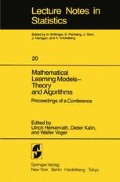Abstract
It is already well known that all stochastic models for learning studied up to now enter the following general scheme (cf.Norman (1972)). The behaviour of the subject on trial n = 0,1,... is determined by his state Sn (an indicator of the subject’s response tendencies) at the beginning of the trial. Sn is a random variable taking on values in a measurable state space (S,S). On trial n an event En +1 occurs that results in a change of state. En +1 is a randon variable taking on values in a measurable event space (E,E) and specifies those occurrences on trial n that affect subsequent behaviour. Typically, En +1. includes a specification of the subject’s response and its observable outcome or payoff. To represent the fact that the occurrence of an event effects a change of state we consider a measurable mapping v of S × E into S and postulate that Sn +1 = v(Sn, En +1), n ≥ 0. Finally, we assume that the conditional probability distribution of En +1 given En, Sn,... depends only on the state Sn and denote it Q(Sn,.).
Dedicated to Professor Octav Onicescu on the occasion of his 9oth birthday
Access this chapter
Tax calculation will be finalised at checkout
Purchases are for personal use only
Preview
Unable to display preview. Download preview PDF.
References
Billingsley, P.(1968) Convergence of Probability Measures. New York: Wiley.
Botkin, J.W., Elmandjra, M. and Malitza, M. (1980) No Limits to Learning. Bridging the Human Gap: A Report fco the Club of Rome. Oxford: Pergamon Press.
Grigorescu, S. and Iosifescu, M. (1983) Dependence with Complete Connections and Its Applicatcions. Bucharest: Scientific and Encyclopaedic Publishing House.(In Romanian)
Heyde, C.C. and Scott, D.J.(1973) Invariance principles for the law of the iterated logarithm for martingales and processes with stationary increments. Ann.Probab. 1, 428–436.
Iosifescu, M.(1963) Random systems with complete connections with an arbitrary set of states. Rev.Math. Pures Appl. 8, 611–645;
Iosifescu, M.(1963) Random systems with complete connections with an arbitrary set of states. Rev.Math. Pures Appl. 9(1964), 91–92.(In Russian)
Iosifescu, M.(l972) On Strassen’s version of the loglog law for some classes of dependent random variables. Z.Wahrsch.Verw.Gebiete 24, 155–158.
Iosifescu, M. and Theodorescu, R.(1969) Random Processes and Learning. Berlin: Springer.
Marliss, G.S. and McGregor, J.R.(1971) The construction of limiting distributions of response probabilities. J.Appl.Probab. 8, 757–766.
Norman, M.F.(1972) Markov Processes and Learning Models. New York: Academic Press.
Popescu, Gh.(1976) A functional central limit theorem for a class of Markov chains. Rev.Roumaine Math.Pures Appl. 21, 737–750.
Popescu, Gh.(1977) Functional limit theorems for random systems with complete connections. Proc.Fifth Conf.Probability Theory (Braşov, 1974), pp.261–275. Bucharest: Publishing House of the Romanian Academy.
Scott, D.J.(1971) Central limit theorems for martingales and for processes with stationary increments, using a Skorokhod representation approach. Adv.in Appl.Probab. 5, 119–137.
Zamfirescu, T. (198l) Most monotone functions are singular. Amer.Math. Monthly 88, 47–49.
Author information
Authors and Affiliations
Editor information
Editors and Affiliations
Rights and permissions
Copyright information
© 1983 Springer-Verlag New York Inc.
About this paper
Cite this paper
Iosifescu, M. (1983). Asymptotic Properties of Learning Models. In: Herkenrath, U., Kalin, D., Vogel, W. (eds) Mathematical Learning Models — Theory and Algorithms. Lecture Notes in Statistics, vol 20. Springer, New York, NY. https://doi.org/10.1007/978-1-4612-5612-0_9
Download citation
DOI: https://doi.org/10.1007/978-1-4612-5612-0_9
Publisher Name: Springer, New York, NY
Print ISBN: 978-0-387-90913-4
Online ISBN: 978-1-4612-5612-0
eBook Packages: Springer Book Archive

